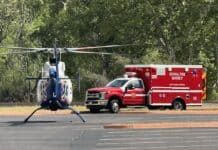
Arizona Game & Fish Department Public Affairs Community Liaison Stevie Kelso and AZGFD Supervisor Tim Holt gave a presentation on living with urban wildlife to the Village of Oakcreek Association on July 11, in response to two or three reports of nuisance coyotes in the VOC. Holt said that there have been no reports of coyotes biting anyone and the reported behaviors do not demonstrate traits that would imply they have the potential to do so.
“When it comes to living with wildlife, the best thing for us and for the wildlife is to keep the wildlife as independent from humans as possible,” Kelso said. “We want them relying on their natural behavior [and] on their natural food sources. The least amount of stuff they can get from us humans, the better it is for them. When animals are around people all the time or when they’re depending on humans for food, they’re going to lose their fears and people and … that’s when human-wildlife conflicts happen. So [the] bottom line is we want wildlife to stay wild.”

Holt and Kelso offered additional suggestions:
* Remove attractants such as food sources, water or potential shelter.
* Do not intentionally feed coyotes because they can associate humans with ready access to food. The Sedona City Council approved a wildlife feeding ban in April 2023 in response to two javelina bites that occurred in 2022 because the animals were attracted to food in the neighborhood.
* Put out trash containers on the morning of pickup to minimize the amount of time wildlife have to get into the containers.
Cleaning trash cans with a 10% chlorine bleach solution will reduce odors and make the receptacles less enticing. n Feed pets indoors and never leave them unsupervised, particularly during dawn and dusk when coyotes are most active. Place small pets in a strong, roofed enclosure. Likewise, house poultry, rabbits and rodents in secure, roofed enclosures.
* Trim bushes and plants to eliminate resting areas for coyotes.
* Encourage coyotes to leave the area by throwing rocks or sticks at them or by making loud noises.
“An indifferent attitude toward a coyote in your yard has the same effect as feeding it,” an AZGFD informational pamphlet handed out at the event stated. “If a coyote is in your yard, you need to make the animal aware it is not welcome.”
AZGFD’s Living with Urban Wildlife website states that coyotes can also transmit canine distemper, canine heartworm and mange mites to domestic dogs.
“Cockroaches and coyotes, I think, can survive through anything,” Holt said. “[Coyotes] survived through governmentsponsored killing programs, poisoning programs and everything else, and they persist to this day, probably in more numbers than they ever have. So [lethal removal] is not a resolution to our problem.”
“We encourage the public to call our dispatch at (623) 236-7201 if they observe wildlife showing unacceptable behavior, such as acting aggressive towards people or pets,” Kelso said.
For more information about living with urban wildlife, visit the AZGFD website at www.azgfd.gov/urbanwildlife or call their Flagstaff office at (928) 774-5045




















